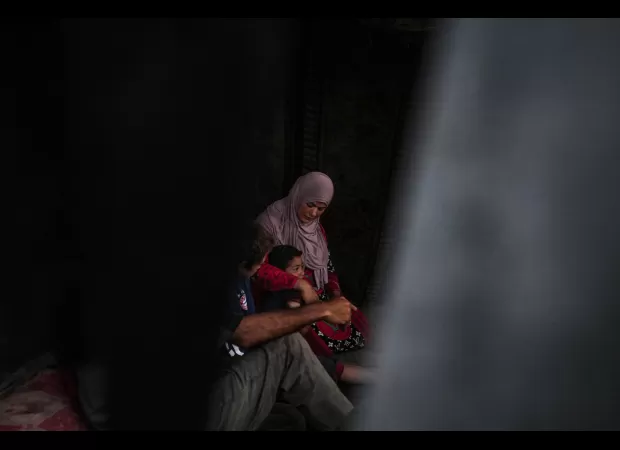Muslim holiday in Gaza dampened by war's impact on families.
Palestinians in Gaza will have a difficult Eid al-Adha this year due to the ongoing war, eating canned food in hot tents instead of celebrating as usual.

In the Gaza Strip, a place that has been ravaged by months of war between Israel and Hamas, the mood is somber as the Muslim holiday of Eid al-Adha approaches. This is usually a time for joyous celebrations, with families gathering for feasts and children receiving new clothes and gifts. But this year, the reality is very different.
Nadia Hamouda, a mother who lost her daughter in the war and was forced to flee her home, now lives in a tent in Deir al-Balah. She mournfully remarks, "There is no Eid this year." The war has left many families with nothing but canned food to eat, and there is a severe shortage of meat and livestock. With no money for traditional holiday treats and presents, the people of Gaza are left to reflect on the devastation that has befallen their home.
The holiday of Eid al-Adha, which commemorates the willingness of Prophet Ibrahim to sacrifice his son, is observed by Muslims around the world. But for the people of Gaza, this year's celebrations are overshadowed by the ongoing conflict and the destruction it has brought. Even before the war, Gaza was a struggling and isolated community, but they still managed to make the holiday special with colorful decorations, surprises for children, and acts of charity.
However, the situation has drastically changed. The war has claimed the lives of over 37,000 Palestinians and has destroyed much of Gaza's agriculture and food production. The people are now heavily reliant on humanitarian aid, which is hindered by Israeli restrictions and the ongoing fighting. As a result, the United Nations has warned that nearly half of the population could face severe starvation in the coming weeks.
To make matters worse, the only route for people to enter or leave Gaza, the Rafah crossing, has been shut down by Egypt. This means that the annual Hajj pilgrimage, which precedes Eid al-Adha, is not an option for the people of Gaza. Ashraf Sahwiel, who is currently living in a tent after being forced to flee his home, expresses uncertainty about his future, saying, "We don't even know if we will be able to return to our homes or if they can even be rebuilt."
For many families, the war has also brought financial ruin. Abdelsattar al-Batsh, a father of seven, shares that his family hasn't been able to afford meat since the war began. Prices for basic necessities, like meat and livestock, have skyrocketed, making it impossible for many to afford. Iyad al-Bayouk, a former cattle farmer, explains that the blockade imposed by Israel has caused severe shortages, leading to the closure of local farms and an increase in prices.
Amidst all this devastation, the people of Gaza still hold onto hope. Mohammed Abdel Rahim, who has been living in a former cattle farm turned shelter, describes the conditions as unbearable in the winter, but the heat has made it more tolerable. For Abdelkarim Motawq, who used to work in the meat industry, the holiday season used to bring good business and joy for his family. But now, he can only dream of those days and wishes he could work again to provide for his loved ones.
As the people of Gaza prepare for Eid al-Adha, their hearts are heavy with grief and uncertainty. They long for the days when they could celebrate with their loved ones and enjoy the simple pleasures of life. But for now, they must endure the harsh realities of war, hunger, and displacement, with no end in sight. This is the sad reality of Eid al-Adha in Gaza this year.
1 Views






